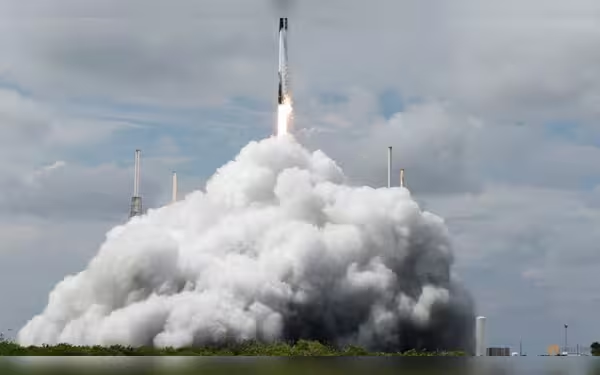Saturday, November 16, 2024 05:49 PM
FAA Authorizes SpaceX Falcon 9 for Hera Mission Launch
- FAA clears Falcon 9 for Hera mission launch.
- Hera spacecraft to study asteroid deflection.
- SpaceX faces scrutiny over safety concerns.
 Image Credits: channelnewsasia
Image Credits: channelnewsasiaThe FAA has authorized SpaceX's Falcon 9 rocket for the Hera mission, aimed at studying asteroid deflection, amidst safety concerns.
In a significant development for space exploration, the U.S. Federal Aviation Administration (FAA) has granted authorization for SpaceX's Falcon 9 rocket to resume flights. This decision comes ahead of a crucial mission scheduled for Monday, which aims to launch the European Space Agency's Hera spacecraft from Cape Canaveral, Florida. The Falcon 9 rocket, known for its reliability and frequent launches, has faced scrutiny recently due to safety concerns raised by the FAA.
The FAA announced on Sunday that the Falcon 9 is cleared to fly specifically for the Hera mission, which is set to lift off at 10:52 a.m. ET (1452 GMT). The agency emphasized that this authorization is limited to the Hera mission, highlighting the importance of safety in space operations. The FAA stated, "The SpaceX Falcon 9 vehicle is authorized to return to flight only for the planned Hera mission scheduled to launch on Oct. 7 from Cape Canaveral Space Force Station in Florida." This cautious approach follows a series of incidents that have raised alarms about the rocket's performance.
One of the primary concerns arose from a malfunction of the Falcon 9's second stage during a previous NASA astronaut mission. This issue led to the booster falling outside the designated safety zone in the Pacific Ocean, prompting the FAA to ground the rocket for the third time in three months. The agency has determined that the absence of a second stage reentry for the Hera mission significantly reduces risks to the public, allowing the mission to proceed.
The Hera spacecraft is set to play a vital role in studying the aftermath of NASA's DART mission, which successfully altered the trajectory of the asteroid Dimorphos in 2022. This groundbreaking test of planetary defense is the first of its kind, and the data collected from the Hera mission will be invaluable for future efforts to redirect potentially hazardous asteroids that could threaten Earth.
Despite the FAA's cautious stance, SpaceX has expressed confidence in its safety protocols. The company has publicly defended its record, asserting that it is the "safest, most reliable launch provider in the world." However, the FAA has not shied away from imposing penalties, recently proposing a fine of $633,000 against SpaceX for violations related to two Falcon 9 launches earlier this year. FAA Administrator Mike Whitaker emphasized the need for the company to operate at the highest safety standards, stating, "They've been around 20 years, and I think they need to operate at the highest level of safety."
As the space industry continues to evolve, the balance between innovation and safety remains a critical focus. The upcoming Hera mission not only represents a step forward in our understanding of asteroid deflection but also serves as a reminder of the importance of adhering to safety regulations in the pursuit of exploration. With SpaceX's ambitious plans for the future, including the Starship program, the collaboration between private companies and regulatory agencies will be essential in ensuring that space travel remains safe and sustainable for all.













